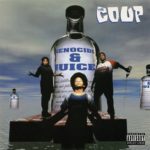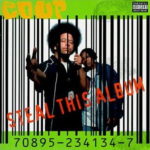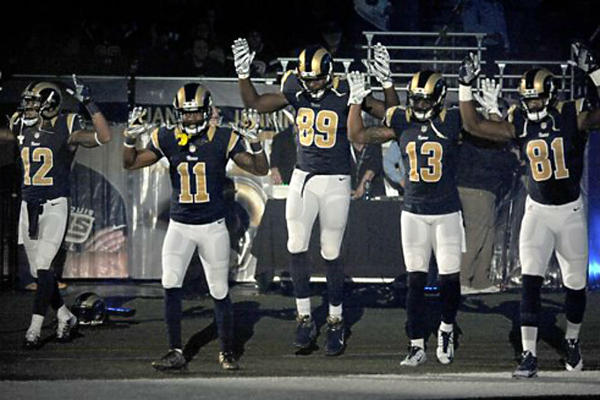When you ask the average fan to think back into Hip-Hop history and rattle off some of their favorite politically conscious emcees, certain names are always expected. Public Enemy told everybody their heroes don’t get stamp status. KRS 1 explained the similarities between officers and overseers. Immortal Technique has discussed the political ramifications of religion for years to the delight and disdain of listeners alike. These folks will admittedly go down in Hip-Hop infamy for bucking the system and taking their listeners for a ride down that contemptuous path with them. However, when fans come off the dome with artists who find themselves in this subset there is usually one glaring and common omission, The Coup.
Boots Riley, E-Roc and Pam the Funkstress were condemning the powers that be during a time when Hip-Hop fans were getting used to lyrical big money fairytales and crime syndicate dreams. They developed their approach from the inconsistent satirical observance of Kill My Landlord to a more piercing angle on their following albums, Genocide & Juice and Steal This Album. The group did lose E-Roc between the two releases, reducing the trio to a duo. However, that didn’t stop the analytical powerhouse that is Boots Riley. But one of these albums has to be better.
The Oakland based group arrived on the music scene during the California funk domination and their production was derivative of that movement. Riley served as producer for both albums with a bit of help from his partner Pam as well as producers Edifice and Brother K. There was plenty of funk in the form of samples, guitar and simple wide open bass lines. While there were some more traditional rap tracks with a suitable amount of thump, the more funk possessed underpinnings with live instrumentation were the crown jewels of the production. The depth and emotion a real instrument brings were absolutely perfect for the effectual narration and subject matter that The Coup dealt with. And both albums were thoughtful and creative commentaries on life, politics and the American way.
 Genocide and Juice was upper echelon political observation disguised as a classic Hip-Hop album. Riley’s ability to tell a 1st person story and think below the socio-economic surface powered the release as he weaved tales on situations from corporate pimping to the realities of your average penniless rapper. The album not only challenged accepted covention on capitalism and democracy, but also provided sonic disdain for a system that the Coup believed was created to sustain the dynamic of rich and poor. However, Boots and company managed to do so in a sophisticated way that kicked preachiness to the curb and they presented these big concepts while retaining the listeners’ attention. That fine line between sermon and song was again walked perfectly by the group on their next release, Steal This Album. They may have done it even better.
Genocide and Juice was upper echelon political observation disguised as a classic Hip-Hop album. Riley’s ability to tell a 1st person story and think below the socio-economic surface powered the release as he weaved tales on situations from corporate pimping to the realities of your average penniless rapper. The album not only challenged accepted covention on capitalism and democracy, but also provided sonic disdain for a system that the Coup believed was created to sustain the dynamic of rich and poor. However, Boots and company managed to do so in a sophisticated way that kicked preachiness to the curb and they presented these big concepts while retaining the listeners’ attention. That fine line between sermon and song was again walked perfectly by the group on their next release, Steal This Album. They may have done it even better.
 Steal This Album, was epic in ambition and those stories were cinematic in scope. Riley’s writing skill was put on full display as he captured the angst and confusion generated by life on the wrong side of the socio-economic tracks. Without the help of his former partner, E-Roc, Riley reiterated his desire to inspire his listeners to think past government propaganda and see the world according to Boots. He also spoke with elaborate detail and passion about a plethora of emotional issues in a manner both well articulated and delivered. Boots chronicles the story of a child who witnesses his mother’s drug addiction and subsequent death as he fights the lure of becoming like the man who killed her. He moves on to a tale of panic as a gunshot victim fights for his life in a hospital that wants to pull the plug because he isn’t insured. There is even a realistic ode to bucket car culture for those who were sick of hearing rappers with no money singing about Bentleys. The material presented in Steal This Album would have been overly melodramatic except it was pulled directly from a side of life rarely tackled by Hip-Hop in such a powerful manner. This album wasn’t contrived in the least; a performance of gritty realism that wasn’t popular in Hip-Hop then and it’s something we don’t see much of now.
Steal This Album, was epic in ambition and those stories were cinematic in scope. Riley’s writing skill was put on full display as he captured the angst and confusion generated by life on the wrong side of the socio-economic tracks. Without the help of his former partner, E-Roc, Riley reiterated his desire to inspire his listeners to think past government propaganda and see the world according to Boots. He also spoke with elaborate detail and passion about a plethora of emotional issues in a manner both well articulated and delivered. Boots chronicles the story of a child who witnesses his mother’s drug addiction and subsequent death as he fights the lure of becoming like the man who killed her. He moves on to a tale of panic as a gunshot victim fights for his life in a hospital that wants to pull the plug because he isn’t insured. There is even a realistic ode to bucket car culture for those who were sick of hearing rappers with no money singing about Bentleys. The material presented in Steal This Album would have been overly melodramatic except it was pulled directly from a side of life rarely tackled by Hip-Hop in such a powerful manner. This album wasn’t contrived in the least; a performance of gritty realism that wasn’t popular in Hip-Hop then and it’s something we don’t see much of now.
So there you have it. Two albums from what may just be the most underappreciated group in the history of Hip-Hop. The music is sonically layered and urbane as is the thought behind it. Riley and the crew managed to stimulate thought without being boring. They gave their side of the story without being preachy and they entertained without becoming falling prey to a Hip-Hop construct that seems to demand allegiance to the superficial. But which affected you the most? Tell us what you think
***To Hear Both Albums Click Picture***
Follow shelz on Twitter @ http://twitter.com/shelzp
Follow Us on Twitter @ http://twitter.com/planetill
Join Us on the Planet Ill Facebook Group for more discussion
Check out Planet Ill’s page on Essence.com
Follow us on Networked Blogs






2 thoughts on “Classic Clash: Genocide & Juice Vs. Steal This Album”